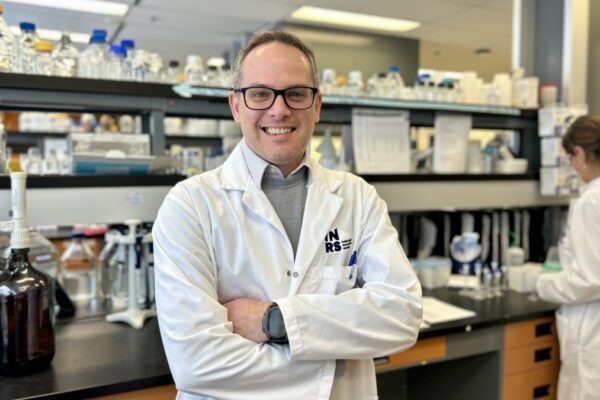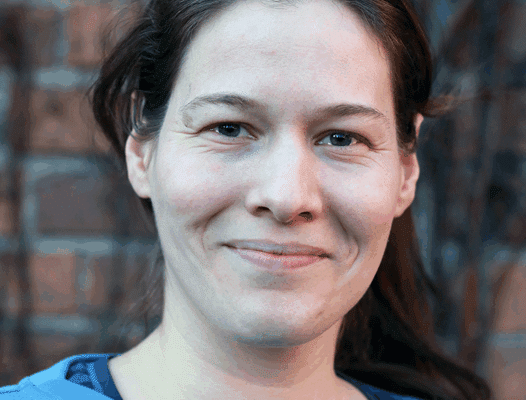- Graduate Stories
Follow the inspiring journeys of INRS graduates: memories, experiences and opportunities punctuate these forward-looking interviews. A series signed by the INRS Foundation.

Claudie Noël dares to let herself be transported wherever inspiration takes her and has a strong need to see the concrete results of her actions. A rugby fan, she says she is a jack-of-all-trades and it was her inquisitive mind that prompted her to undertake a master’s degree in experimental health sciences at the Centre Armand-Frappier Santé Biotechnologie of the Institut national de la recherche scientifique (INRS) and that led her to what she describes as an atypical career outside the walls of academia, at Montréal InVivo, an industrial cluster that brings together players in Montréal’s life sciences and health technology ecosystem.

“You have to dare, explore, make yourself known, seize opportunities and take your place. There is no perfect path. But you have to persevere and learn constantly, while having fun.”
Claudie Noël, Master’s in experimental health sciences, 2016
Senior director, Operations, Montréal InVivoo
From the outset, she says she prefers “hybrid” career opportunities, which draw on her science background without confining her to the laboratory. It was during her studies for a bachelor’s degree in microbiology at Université Laval that she came to know the INRS. More specifically, it was during a research internship where she met Jean-Christophe Simard, then a doctoral student at the Centre Armand-Frappier Santé Biotechnologie, that she discovered the “beautiful and positive atmosphere” of the laboratory of Professor Denis Girard, a researcher specializing in inflammation and the physiology of granulocytes, the front-line cells in the fight against infections.
As she wonders in which lab she’ll land for her master’s, her conversation with Professor Girard is decisive for the next step: “During our meetings, he sold me his laboratory and his research projects in nanotoxicology, an emerging niche, more than he asked me interview questions. It was this open approach that convinced me,” she says. So she moved to the city and began her master’s degree in experimental health sciences, during which she worked on several research projects that quickly produced results and enabled her to publish scientific articles. “Working with Denis was a great experience, he was very flexible, he trusted his students and gave me responsibilities. I had a lot of fun working with his research group, the ‘DG family’. I saw that we could have fun and be rigorous enough to produce results at the same time,” she says.
The research project on which her master’s thesis is based required the use of gold particles. “I realised the favourable conditions I had been offered when I was asked at the submission of my thesis if I knew how much my research had cost. We are lucky that public funds allow us to advance knowledge,” she says.
She believes it is essential to participate in science popularisation initiatives. During her master’s studies, she twice hosted young people in the Apprentis chercheurs program and worked at the Musée Armand-Frappier, which is dedicated to the interpretation of health sciences. She felt it was important and stimulating to show young people around her laboratory to talk about research and get them interested in science.
She turned down the fast-track to a PhD because she felt she was “not passionate enough” about research work and then worked in quality control in the food industry, a job she found “too structured” for her liking, before continuing her studies in project management. “There was something missing,” she says. Then she got a job as a project manager at Parkinson Quebec, where she set up a webinar series—groundbreaking in the pre-pandemic era—that allowed patients to learn more about advances in research on the disease. “I was able to combine my knowledge of health sciences, my ability to popularise and my project management skills and bring this to the patients. The impact was tangible,” she says with a twinkle in her eye.
While pursuing her passion for rugby—after playing with the Carabins, she coached various men’s and women’s teams and now chairs the board of the Quebec Rugby Federation—she has been working her way up at Montreal InVivo for the past four years and doesn’t regret taking opportunities outside of academia, although INRS holds a special place in her heart. Responsible for the cluster’s workforce and succession initiatives, she is thinking of organizing networking activities between industry members and students to allow the latter to ask questions in a space conducive to exchanges and new opportunities.
“If I had to do it all over again, I would invest more in networking, I wouldn’t hesitate to go and talk to professionals from a pharma, to do an internship in the private sector or to talk to other players in the health sciences ecosystem. You have to dare, explore, make yourself known, seize opportunities and take your place. There is no perfect path,” she insists. “But you have to persevere and learn constantly, while having fun,” she concludes.
[As told to the Foundation in April 2023.]
Discover the INRS Foundation and its activities. See website



